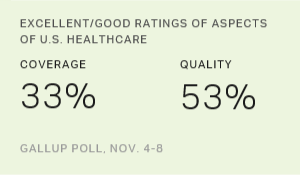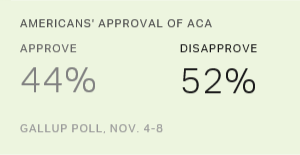Story Highlights
- First time a majority has held this view since 2008
- Most still prefer private insurance system to government-run system
WASHINGTON, D.C. -- U.S. adults are slightly more likely to say it is the responsibility of the federal government to ensure all Americans have health insurance coverage (51%) than to say it is not the government's responsibility (47%). The percentage who believe the government has that obligation is up six percentage points from 2014. This year marks the first time since 2008 that a majority of Americans say the government is responsible for making sure all citizens have health insurance.
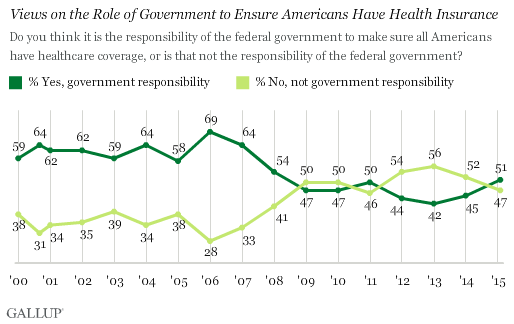
From 2000 to 2008, between 54% and 69% of Americans said ensuring healthcare coverage for all citizens was the responsibility of the federal government. But the issue grew more divisive in 2009, as President Barack Obama worked to enact the Affordable Care Act, which Congress passed in 2010. Between 2009 and 2011, Americans were split nearly evenly on the matter. Then from 2012 to 2014, public opinion shifted, with slight majorities saying healthcare coverage was not the government's responsibility.
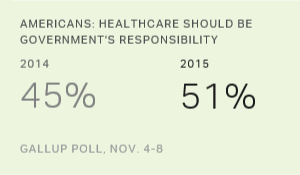
The latest poll was conducted Nov. 4-8 as part of Gallup's annual Health and Healthcare survey.
The percentage who feel the government should have this responsibility has increased across most key demographic groups since 2014, including lower-income Americans (+13 points), 50- to 64-year-olds (+12 points), Democrats and independents who lean Democratic (+9 points) and whites (+8 points). Across three of the country's four regions, this view has increased by seven points or more; the South is the only region where there has been no such change.
Americans who approve of the Affordable Care Act are more than three times as likely as those who disapprove of the law to say healthcare coverage should be the government's responsibility, 80% vs. 26%, respectively.
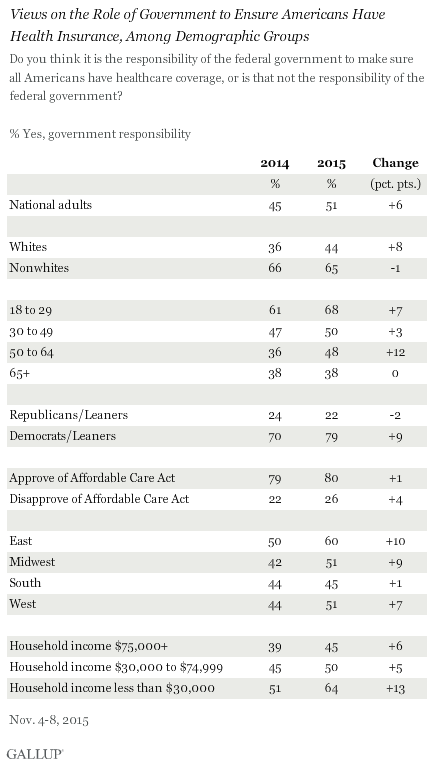
Less than half of whites, Americans aged 50 and older, Republicans and independents who lean Republican, Southerners and higher-income Americans say healthcare coverage is the federal government's responsibility.
Americans Still Favor Private Insurance System
Although U.S. adults lean toward the view that the government should ensure all Americans have healthcare coverage, they do not endorse a government-run system, which exists in most other Western nations. When given a choice, 55% say they prefer a system mostly based on private insurance, as the U.S. has now, while 41% would prefer a government-run system. The percentage favoring a private system is down from 61% last year.
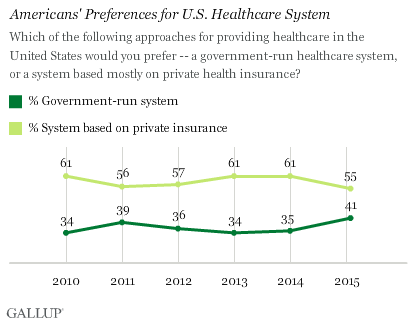
Despite receiving Medicare, which is mostly paid for by the government, senior citizens are the least likely to favor a government-run system (31%). The only age group in which a majority favor a government-run healthcare system are those younger than 30 (53%). Support for a government-run system drops with each subsequent age group.
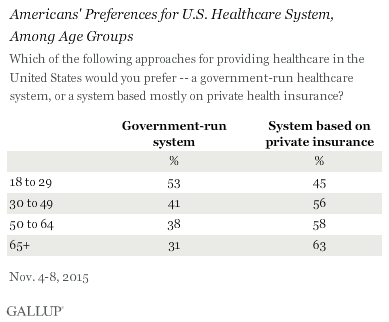
Bottom Line
Though Americans' views on the government's role in healthcare coverage have fluctuated in recent years, they remain just as contentious now as they were prior to the passage of the Affordable Care Act.
The latest result is the most favorable toward the view that the government should be responsible for healthcare coverage since the government took arguably the most significant step in that direction through passing the healthcare law. Still, Americans remain divided on the matter, and continue to favor a system based mostly on private health insurance to a totally government-run system.
Americans' views on the government's responsibility for ensuring healthcare coverage have changed during the Obama administration, with Americans less in favor of the government having that role than before. These data are important to monitor as Obama leaves office, especially because the fate of the healthcare law may depend on the outcome of the 2016 presidential election. Its existence is all but assured if a Democrat wins, but is far less certain if a Republican is elected.
Historical data are available in Gallup Analytics.
Survey Methods
Results for this Gallup poll are based on telephone interviews conducted Nov. 4-8, 2015, on the Gallup U.S. Daily survey, with a random sample of 1,021 adults, aged 18 and older, living in all 50 U.S. states and the District of Columbia. For results based on the total sample of national adults, the margin of sampling error is ±4 percentage points at the 95% confidence level. All reported margins of sampling error include computed design effects for weighting.
Each sample of national adults includes a minimum quota of 60% cellphone respondents and 40% landline respondents, with additional minimum quotas by time zone within region. Landline and cellular telephone numbers are selected using random-digit-dial methods.
Learn more about how the Gallup Poll Social Series works.
